

Manifesto For The Content Curator: The Next Big Social Media Job Of The Future ? Every hour thousands of new videos are uploaded online.
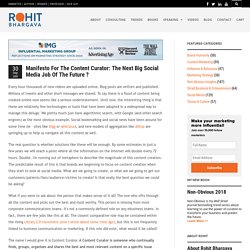
Blog posts are written and published. Millions of tweets and other short messages are shared. To say there is a flood of content being created online now seems like a serious understatement. Until now, the interesting thing is that there are relatively few technologies or tools that have been adopted in a widespread way to manage this deluge. We pretty much just have algorithmic search, with Google (and other search engines) as the most obvious example. The real question is whether solutions like these will be enough. What if you were to ask about the person that makes sense of it all?
The name I would give it is Content Curator. In an attempt to offer more of a vision for someone who might fill this role, here is my crack at a short manifesto for someone who might take on this job: In the near future, experts predict that content on the web will double every 72 hours. Crowdsourcing: Crowdsourcing: définition. Late last week I pointed to a Wikipedia entry as evidence that crowdsourcing had become a bonafide neologism.
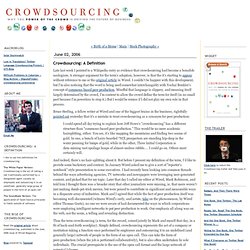
A stronger argument for the term's adoption, however, is that the it's starting to appear without reference to me or the original article in Wired. I couldn't be happier with this development, but I'm also noticing that the word is being used somewhat interchangably with Yochai Benkler's concept of commons-based peer production. Mindful that language is slippery, and meaning itself largely determined by the crowd, I'm content to allow the crowd define the term for itself (in no small part because I'm powerless to stop it.)
But I would be remiss if I did not play my own role in that process. Bruce Sterling, a fellow writer at Wired and one of the biggest brains in the business, rightfully pointed out yesterday that it's a mistake to treat crowdsourcing as a synonym for peer production: And indeed, there's no hair-splitting about it. How today’s college students use Wikipedia for course-related research. Findings are reported from student focus groups and a large–scale survey about how and why students (enrolled at six different U.S. colleges) use Wikipedia during the course–related research process.
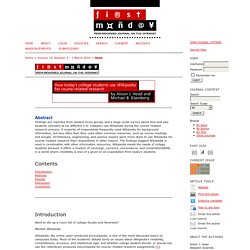
A majority of respondents frequently used Wikipedia for background information, but less often than they used other common resources, such as course readings and Google. Architecture, engineering, and science majors were more likely to use Wikipedia for course–related research than respondents in other majors. The findings suggest Wikipedia is used in combination with other information resources. Wikipedia meets the needs of college students because it offers a mixture of coverage, currency, convenience, and comprehensibility in a world where credibility is less of a given or an expectation from today’s students. What is Content Curation?
Qu'est-ce que Conservation de contenu?
Classification à facettes. La Curation, la branlette intello du moment. « Curation » ou webinage? Un concept à ne pas louper. Les mots intraduisibles ont ceci de merveilleux qu’ils rappellent l’importance du vocabulaire, titillent l’inventivité et poussent au néologisme.
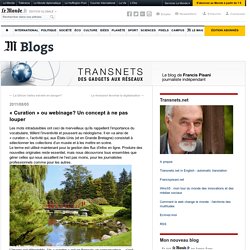
Il en va ainsi de « curation », l’activité qui, aux États-Unis (et en Grande Bretagne) consistait à sélectionner les collections d’un musée et à les mettre en scène. Le terme est utilisé maintenant pour la gestion des flux d’infos en ligne. Produire des nouvelles originales reste essentiel, mais nous découvrons tous ensembles que gérer celles qui nous assaillent ne l’est pas moins, pour les journalistes professionnels comme pour les autres.
Tout savoir sur la curation et le curator. 20 plateformes de curation à expérimenter. Curator, curation...
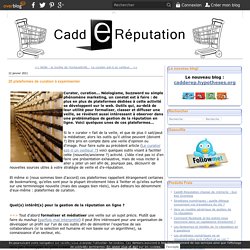
FADBEN. Sur une maîtrise des littératies et de la capacité de lecture et d’écriture.
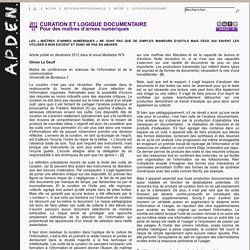
Nulle révolution ici, si ce n’est que ces capacités s’exercent sur une variété de documents de plus en plus importante. Les productions transmedia (qui mêlent divers types de sources et de formes de documents) nécessitent la voie d’une translittératie - [6]. Mais, quel que soit le support, il s’agit toujours d’analyser des documents et des textes (au sens de Jeanneret pour qui le texte est ce qui nécessite une lecture, cela peut donc être également une image ou une vidéo).
Digital Humanities Data Curation Institute summer 2013 workshop now accepting applications. Digital Humanities Data Curation, a series of three-day workshops, will provide a strong introductory grounding in data curation concepts and practices, focusing on the special issues and challenges of data curation in the humanities.
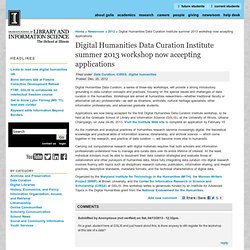
Workshops are aimed at humanities researchers—whether traditional faculty or alternative (alt-ac) professionals—as well as librarians, archivists, cultural heritage specialists, other information professionals, and advanced graduate students. Applications are now being accepted for the first Digital Humanities Data Curation Institute workshop, to be held at the Graduate School of Library and Information Science (GSLIS), at the University of Illinois, Urbana-Champaign, on June 24-26, 2013.
Visit the Institute Web site to complete an application by February 15. Carrying out computational research with digital materials requires that both scholars and information professionals understand how to manage and curate data over its entire lifetime of interest.